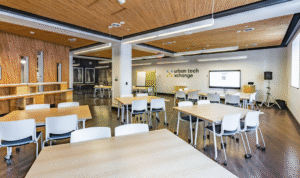
- Kim Kisner
- Education
- 06/25/2024
Working to Advance Equitable, Just, Climate Action
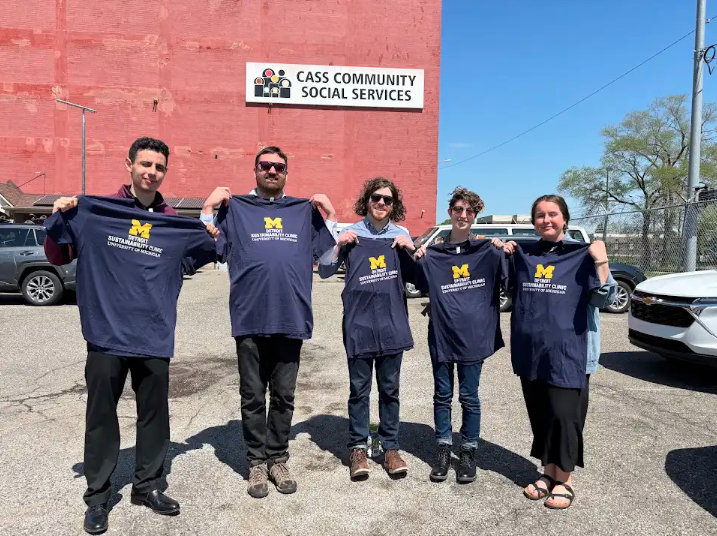
For two-plus years, Dr. Tony G. Reames was a Biden-Harris Administration presidential appointee, working in energy justice. Most recently he served as the Principal Deputy Director for the Office of State and Community Energy Programs at the U.S. Department of Energy (DOE).
Now, he returns to the University of Michigan – where had worked as a research fellow – becoming the Tishman Professor of Environmental Justice and serving as the new Director of the School for Environment and Sustainability (SEAS) Detroit Sustainability Clinic.
Through support from the Kresge Foundation, the clinic was founded in 2021 to build long-term capacity and partnership in Detroit, and to connect residents, nonprofit organizations, businesses, and city government to its resources.
Reames sat down with SBN Detroit to discuss this new role, the work of the clinic, and how it involves and impacts businesses in Southeast Michigan.
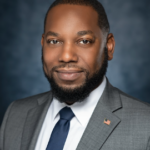
Q: What is the impetus behind the clinic?
A: The Detroit Sustainability Clinic came into existence based on the recognition that the several faculty in the School for Environment and Sustainability had projects with community-based organizations, government, and business partners in the city that we were approaching in silos.
Operating together as a clinic allows us to more cohesively engage with community partners and approach these projects in a more efficient and effective way.
Our mission is to be a hub for advancing sustainability and climate action in an equitable and just way. We want to foster long-term relationships with community-based organizations, local governments, and businesses in Detroit to support their sustainability and climate efforts from ideation to implementation.
Q: What differentiates the work the clinic does from that of other national or local initiatives in the space?
A: We want to be both additive and complementary.
Also, what is unique about what we provide is that we can bring the full resources of the university to support sustainability and climate action in communities, centered on equity and justice.
We have the opportunity to not only use our research and data but to also boost capacity for community-driven efforts through our students and faculty.
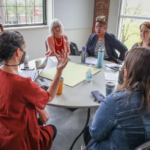
Q: How does sustainability feature in the work the clinic does?
A: Sustainability for me is recognizing the social, environmental, and economic impacts of the current climate crisis and how we use the research, teaching, and other resources of the University in deep collaboration with our community partners to support a community’s long-term existence. It’s the triple bottom line.
We bring these aspects together to help communities with solutions-driven planning and implementation
Q: Given the focus on Detroit communities, how does the Detroit Sustainability Action Agenda feature in the work the clinic is doing?
A: I participated in planning efforts to develop the city’s Sustainability Action Agenda and Climate Strategy and the Detroit Climate Action Plan. These plans are the foundation for the areas of focus for the clinic. The Detroit Office of Sustainability is a clinic partner, and we have funding to work with the city to implement its climate strategy and Blight to Beauty Initiative. Supporting local sustainability and climate action is the core of what we do.
As the clinic expands, I look forward to working with other local governments in Southeast Michigan to create and implement their sustainability and climate action plans.
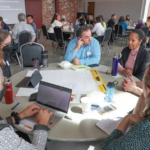
Q: How do you plan to involve and work with businesses in Detroit?
A: I’ve been working with folks in Detroit for about ten years and the ingenuity in this city stands out. I’ve spent a good amount of time with entrepreneurs and start-ups that are working on new technology and other ways to help households operate more sustainably.
I see the clinic acting as a conduit between businesses that have these technical solutions and communities that need these solutions.
As a university, we also have this amazing opportunity to develop the next generation of the sustainability and climate workforce.
Q: How do you think that impacts businesses in Southeast Michigan?
A: I believe that exposing students to real-world challenges makes them better employees for the business and organizations they’ll go to work for.
And I think that students who get involved with businesses and projects in Detroit are more likely to remain in Detroit and continue working here post-graduation. I’ve seen it happen. Once a student is exposed to the issues and opportunities here and has made a professional connection, they are more likely to join the workforce locally versus moving out of state.
Q: What is the role of businesses in the community work you do?
A: Both residents and businesses make up a community so it’s all interconnected. Businesses support residential neighborhoods and vice-versa, so our approach is place-based, taking into account how the community operates and interacts as a whole.
Also, when we think about the growth in different sectors in Southeast Michigan such as landscape architects focused on natural solutions to flooding, engineers working on the next iteration of mobility that eliminates pollution, or those developing a future where all housing is affordable and net zero energy, there is an ecosystem that must connect our greatest challenges to resources and solutions. And that is happening here. Businesses that can tap into this ecosystem and be a part of it will be the most successful businesses going forward.
Q: How do you think you can help develop and support this ecosystem in your new role?
A: I recently spent 2.5 years at the U.S. Department of Energy focused on designing federal programs with equity and justice at the core, and that’s one of the reasons I’m excited to move forward in this role. We have an unprecedented opportunity to move the needle on this. Businesses now have to focus on equity in order to access much of the current federal and state funding, and they have to meaningfully engage with the community as well.
This is an exciting time! We are all starting to speak the same language. I’m optimistic, because I believe the way businesses, communities, and government are now addressing sustainability and climate change is different than in the past, and the Detroit Sustainability Clinic is here to support.
Be sure to subscribe to our newsletter for regular updates on sustainable business practices in and around Detroit.
Kim Kisner
- All
- Business
- Community
- Education
- Events

Eastern Market Partnership, in collaboration with the City of Detroit’s Office of Sustainability Urban Agriculture Division, has announced $240,000 in grant funding to support Detroit-based farmers and farmer collectives. The grants will advance food access, climate education, sustainable land use, and economic opportunity, with priority given to Black- and Indigenous-led farms, youth-led initiatives, and projects rooted in historically disinvested neighborhoods. The recipients – ranging from cooperatives and community...

Citizen Robotics is a Detroit-based nonprofit that advances the use of robotics and digital manufacturing in residential construction, focusing on improving productivity, sustainability, and long-term affordability. Best known for its early work in 3D-printed housing, it explores how alternative construction methods and new financial models can reduce material waste, lower lifetime operating costs, and enhance the resilience of homes. SBN Detroit interviewed Tom Woodman, founder and president of...

Detroit-based OneSix Energy is a clean-energy technology company focused on advancing a lower-carbon approach to hydrogen production. Headquartered at Newlab in Detroit, the startup is developing a proprietary methane pyrolysis system designed to produce hydrogen without carbon dioxide emissions, while also generating solid carbon as a co-product. SBN Detroit interviewed with cofounder Stefan Sysko about the company’s origins, its approach to hydrogen production, and why Detroit is positioned...






